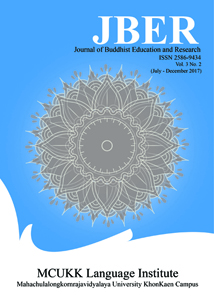The Development of School Management Model by Integrating with Sufficiency Economy’s Philosophy for Elementary Schools in Lower-Northeast Area
Keywords:
Model, School management, Integration, Sufficiency Economy’s PhilosophyAbstract
The objectives of this research were 1) to study the components of school management model by integrating with Sufficiency Economy’s Philosophy for elementary schools in Lower-Northeast area, and 2) to create the school management model by integrating with Sufficiency Economy’s Philosophy for elementary schools in Lower-Northeast area. The methodology was divided into two phases. The first phase was to review the related literature, interview the experts and then bring the information to integrate with four management principles, namely academy, budget, personnel, and general management. The second phase was to create the model and bring to group discussion by the nine experts. The obtained data were analyzed by using mean, standard deviation and content analysis. The research results were as follows: 1) the school management model by integrating with Sufficiency Economy’s Philosophy for elementary schools in Lower-Northeast consisted of four main points: 1) academic management, 2) budget management, 3) personnel management, and 4) general management; 2) the school management model by integrating with Sufficiency Economy’s Philosophy for elementary schools in Lower-Northeast both in overall and each item was at a much level which had appropriateness of those four principles.References
Buchit Mokharat. (2017). The Relationship between Brahmavihara and Ethics
of Teacher towards Students. Journal of Graduate MCUKKK honkaen campus, 4 (1), 1-14.
Grader, C. V. (2004) Dictionary of Education. New York: Mc Graw-Hill.
Jitjirajan, J. (2010). The Model Development in Higher Education
Management by Applying Philosophy of Sufficient Economy of Private
University in Thailand. Bangkok: National Research Council of Thailand.
Kolter. (2003). Human Motivation. (4th ed). California: Brooks Cole Publishing Company.
Udomkitmonkol, C. (2009). Solving Guidelines of District Administrative Development
of Sakon Nakhon City Municipal. Faculty of Management Science: Rajabhat Sakon Nakhon University.
Wongyai, W. (2011). Curriculum Innovation and Learning to Citizen Being.
Bangkok: Ar Ann Print Limited.
of Teacher towards Students. Journal of Graduate MCUKKK honkaen campus, 4 (1), 1-14.
Grader, C. V. (2004) Dictionary of Education. New York: Mc Graw-Hill.
Jitjirajan, J. (2010). The Model Development in Higher Education
Management by Applying Philosophy of Sufficient Economy of Private
University in Thailand. Bangkok: National Research Council of Thailand.
Kolter. (2003). Human Motivation. (4th ed). California: Brooks Cole Publishing Company.
Udomkitmonkol, C. (2009). Solving Guidelines of District Administrative Development
of Sakon Nakhon City Municipal. Faculty of Management Science: Rajabhat Sakon Nakhon University.
Wongyai, W. (2011). Curriculum Innovation and Learning to Citizen Being.
Bangkok: Ar Ann Print Limited.
Downloads
Published
2017-12-28
How to Cite
Dongphimai, T. ., Pondet , S. ., & Vajarintarangoon, K. . (2017). The Development of School Management Model by Integrating with Sufficiency Economy’s Philosophy for Elementary Schools in Lower-Northeast Area. Journal of Buddhist Education and Research (JBER), 3(2), 41–47. retrieved from https://so06.tci-thaijo.org/index.php/jber/article/view/243042
Issue
Section
Research Article





